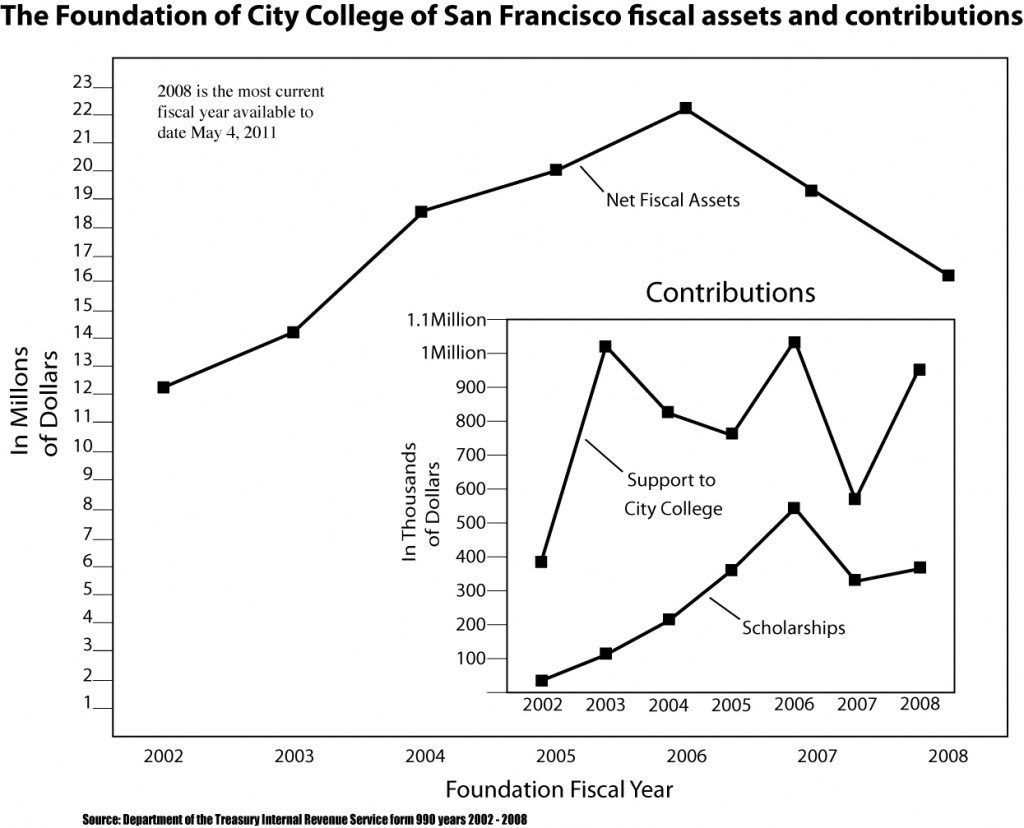Foundation strives to fund City College

By Brant Ozanich
The Guardsman
In this time of drastic and painful budget cuts to the California community college system, it’s hard to see any sort of optimism for City College and public education.
The Foundation of City College of San Francisco has found this optimism, believing that by working with the district, the school and donors, they have outlined the specific needs for the college and hope to turn the situation into a fundraising opportunity.
By diverting a portion of money formerly used for scholarships toward restoring canceled class sections, the foundation board — made up of administrators, foundation trustees and community members — thinks they can help solidify stronger long-term relationships with donors that can help strengthen the foundation and the college.
“It’s an approach that will not only benefit the school in the short term, but will also benefit the school over many many years,” said Terry Otton, president of the foundation’s board. “There’s greater public awareness today of what has happened to our education system. Unless we all support it, the greater provider of skills in this city will be permanently impaired.”
From 2002 to 2008, the foundation has given a rough average of $285,000 per year for student scholarships and another $844,000 in support for the college, which they funded by both accepting donations and investing their assets in public securities, which averaged roughly $17.5 million over the period.
While the foundation couldn’t give exact figures for the upcoming fiscal year, they speculated that there would be less money allocated for scholarships and more given directly to the college.
“Our interests are aligned with the school and what the school has identified as its principle priority, and that’s now what our principle priority is,” Otton said. “Our focus today, in collaboration with the school, is to restore classes. We have worked very diligently with the district to determine what the district’s priorities are.”
In addition to developing this new strategy, the foundation cut administrative ties with the college in early 2010 to be in control of their own bookkeeping and accounting, even though it was already a largely separate entity.
The split from the college is thought by some to be a response to the 2006 abuses of college funds donated to a campaign through the foundation, but Otton dismissed that notion, calling the split a “separation of duties” that facilitates a more efficient and effective carrying out of donors’ requests.
“We felt that the books and records of the foundation were better maintained by us. Donors would expect that as well,” Otton said. “I think people have made this distinction that we’re splitting off. That connotes something bad.”
The foundation also formed a committee among its board called the Restoring Classes Committee, which will help align and utilize the resources of the foundation with a focus on restoring canceled class sections for the college.
“It is important that we communicate with people in the private sector to have them start thinking about the private sector funding public education,” Bill Brinton, board member and head of Restoring Classes Committee, said.
The committee, which includes nine of the 24 board members, was partly formed to keep the foundation’s attention focused on restoring classes as well as helping to solicit longer-term relations with donors, Otton said.
Another large source of funding the foundation is pursuing is from the Bernard Osher Foundation, which will match funds raised by the Foundation for California Community Colleges on a two-to-one ratio.
“[We have] a $1.6 million goal to meet, then the Osher Foundation will match $800,000,” Judy Prokupek, a City College foundation staff member, said. She mentioned that meeting this goal will provide $2.4 million for City College students over a long period of time.
The Foundation of City College has provided a large contribution to the cause, which can potentially raise $100 million for the system as a whole.
The money will be given to the Foundation for California Community Colleges, which will distribute the proper portion to City College students in the form of scholarships.
“When we started we thought every one of the 112 community colleges would be able to contribute a little slice. Some colleges have contributed more than their share and some, for whatever unfortunate reason, have not been able to contribute very much,” Andy Lynch of the Bernard Osher Foundation said. “City College is among the leading contributors.”
Email:
bozanich@theguardsman.com
